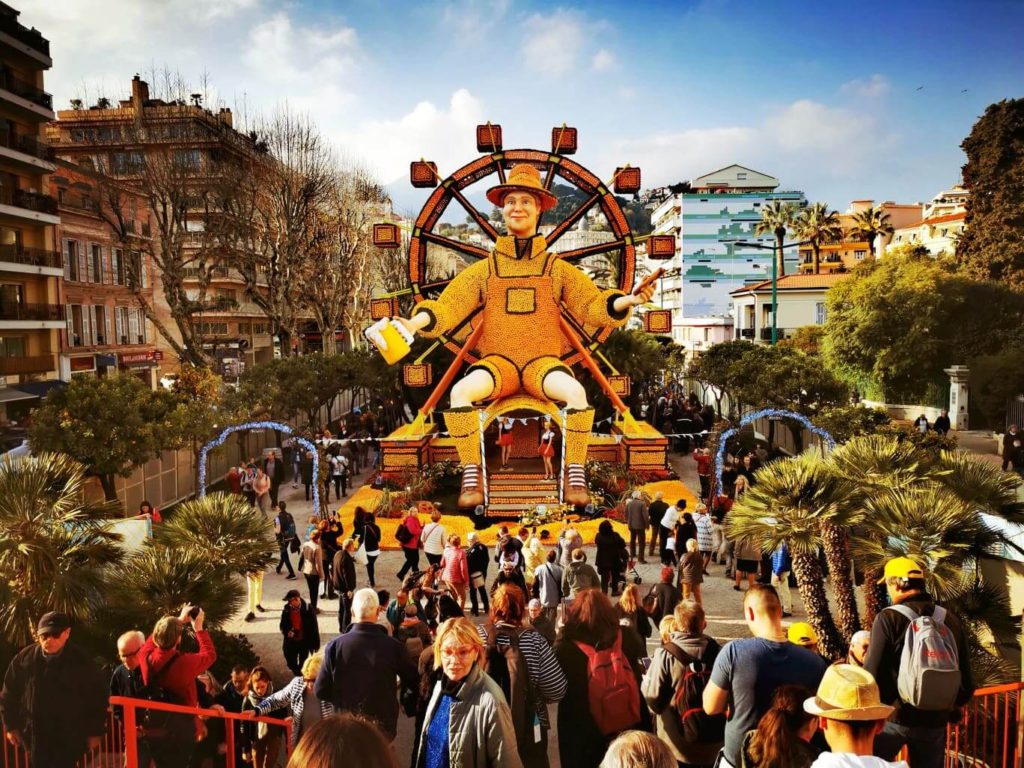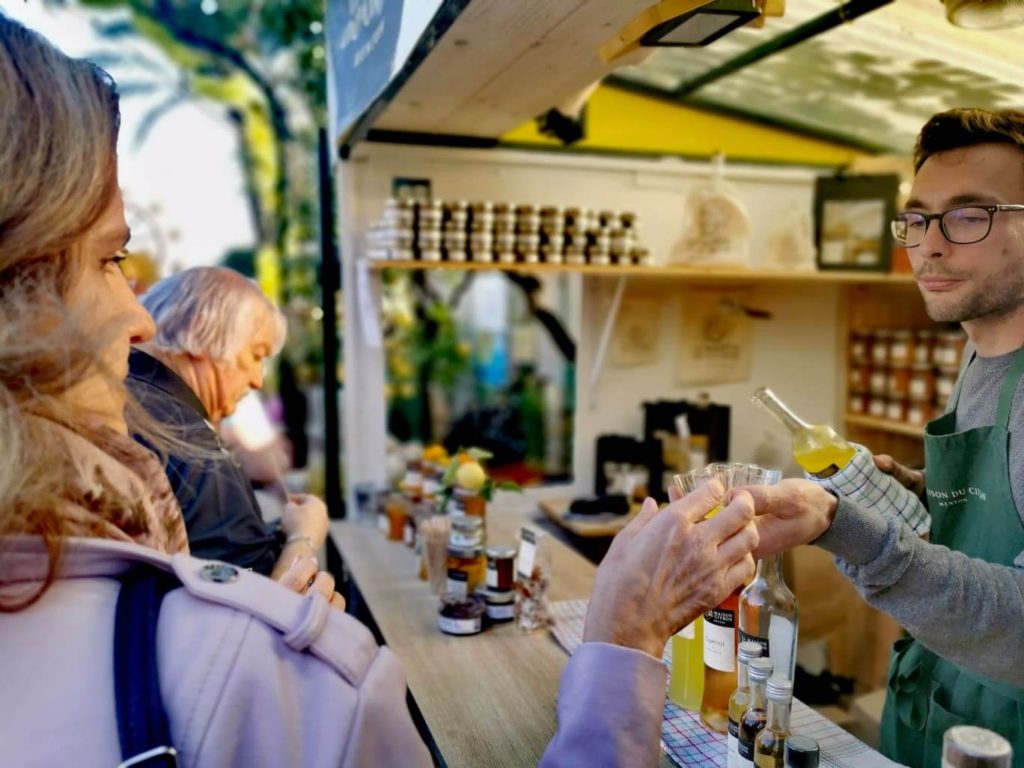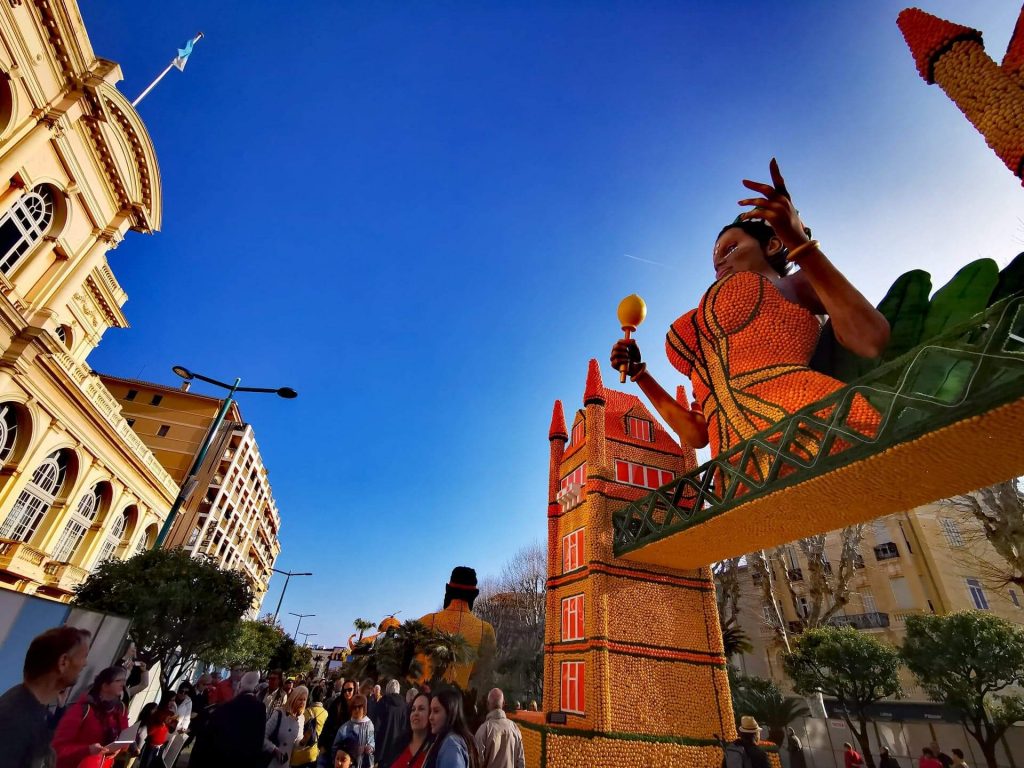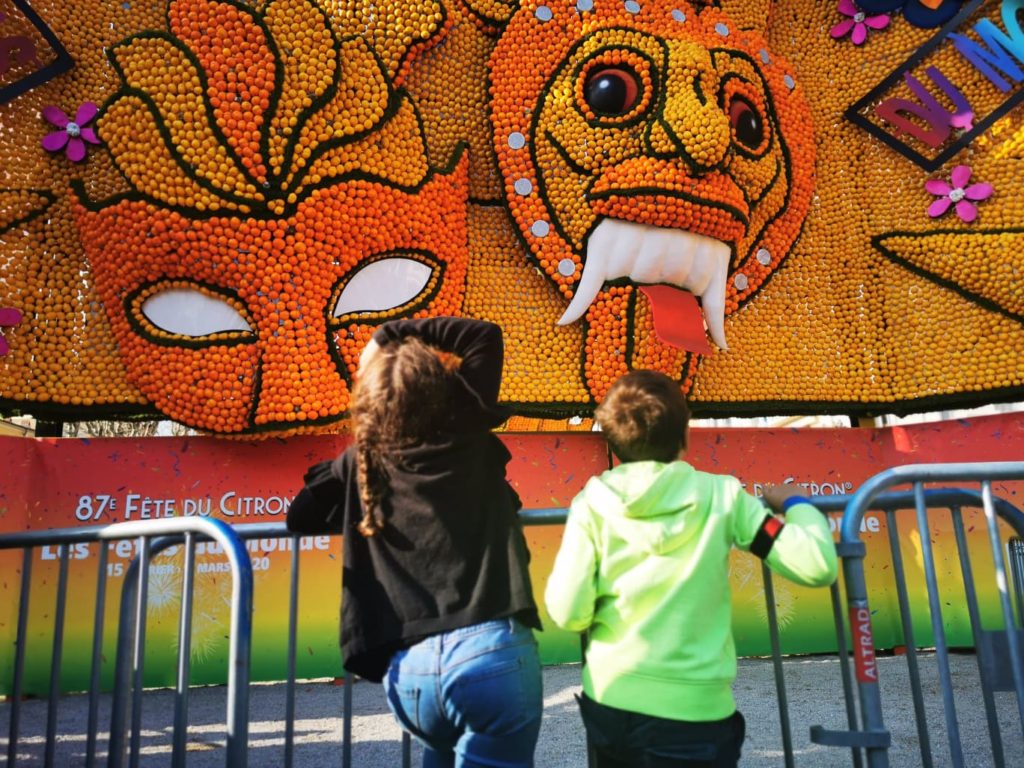
Wait! Before proceeding, take a minute to the kitchen, heat a nice glass of water and squeeze in a half of a lemon juice and while reading this story, kindly, enjoy your cup of warm lemon juice to set you in the right mood with awesome health benefits as well.
Ok, now that you are back, I want to ask you, if you were really crazy about a particular fruit, how cool would it be to attend a festival dedicated only to that fruit?
If you happen to be a lemon lover, I’ve got you some good news. In the French city of Menton, there is a whole festival dedicated to this fruit and more!

The trip before the Corona times
My last trip before the most discussed disease – “COVID -19” broke out in Europe, was to Nice, in France. It was kind of an “exotic” trip for me because it was with a tourist group – and this was something I hadn’t done since childhood. It had its benefits and downsides, but for the sake of experience, learning how to think of others and not just myself during the trip, made it all worthwhile and educative. This knowledge comes in handy at the present moment, where people are permanently isolated, and you practically continuously have to be conscious of those around you when you visit the shopping malls for groceries.
But, let’s get back to the sweet pre-corona times and France – our last stop before heading back home was the french city of Menton and its Lemon festival. I had no expectations of how it would be, but as l am one of them – the lemon lover, l had to see it. Unfortunately, we had only one hour to enjoy the whole experience – the downside of travelling with a group, I thought in the beginning. However, after that hour, I considered it an advantage because this short hour didn’t give me the time to spend the money on all the variety of products made of lemon, which was so tempting, but at least I managed to take some pictures.
So let me take you through an express trip and tempt you to get into the sour and yellow pleasures next time you happen to be in France between the end of February and the beginning of March when the virus hopefully will be won over.

Why lemons, and Why Menton?
According to the legend, while fleeing from Paradise, Adam and Eve took one of the paradise lemons with her, but Adam, on the other hand, feared the anger from God and asked Eve to let it go. Eve agreed, but only at a spot, she decides. After crossing many places, they arrived at the Bay of Garavan. The beauty of the bay, its mild climate, and exotic plants evoked memories of the garden of Eden, so Eve planted the lemon in the soil, and Menton was born.
But according to historians, the cultivation of lemons started in the 15th of the century, thanks to the climate, which is labelled a near-subtropical micro-climate with mild winters and hot summers due to the protection of the Alps. And that is precisely what is needed to grow delicious citrus fruits, which explains why in the 1800s, there were around eight thousand lemon trees in Menton, and until the 1930s, Menton was Europe’s biggest lemon producer.
However, the citrus production declined at the end of the 19th century due to the fragmentation of farms, diseases, and bad weather, agricultural exodus, and the strong development of urban planning. Only in the 1980s replantation promotion operations were carried out by the local authorities, and in the 1990s, more than five thousand trees had been planted again.
Today, thanks to these efforts, there are about 15 citrus growers in the regions of Menton, Roquebrune, Sainte-Agnès, and Castellar, and the goal is to reach 15,000 trees recognized by a PGI (Protected Geographical Indication). With an annual production of about 200 tons, the industry is regaining its former strength. I also heard, that young citrus farmers are more than welcome in the town’s unconstructed areas, and they even get support for cultivating lemons. Anyone with hidden lemon farming dream reading here?

How did the lemon parade start Menton?
Menton festival is a great celebration for the locals and the guests as well, even though during the hour we spent there, we were one of the very few foreigners, but as I read the history, I realized that the festival was explicitly made for foreigners.
It all started in the period called the Belle Époque. In 1860, English doctor James Henry Bennett (if you haven’t heard of him before, his most notable patient was Queen Victoria) published a treatise, “Winter and Spring on the Shores of the Mediterranean,“ where he praised the mild climate of the town while mentioning those suffering from tuberculosis. The English doctor had been one of the infected himself, but after spending time in Menton to actually die from the disease, he became completely healed. He believed his health had improved, thanks to the mild winter weather at the French Riviera. With his work, the doctor managed to popularise Menton and its surroundings as an upper-class winter holiday and healing destination.
Soon after, English and Russian aristocrats started journeying to Menton to spend their winters. That left hoteliers with the question of how to entertain the numerous foreign guests. In 1928, a hotelier from Hôtel Riviera made a successful attempt and organized an exhibition of flowers and citrus fruits in the hotel’s gardens. It was so acknowledged that the following year, the event moved into the streets, with carts decorated with orange and lemon trees.
As the city council of Menton could feel the end of the Belle Époque and the decreasing attendance of wealthy winter visitors, they saw great potential in creating a similar event for maintaining the present foreigners and attracting new ones. The result was the birth of the Citrus Festival, which was officially created, with the first parade taking place the following year.
What can you experience?
In numbers, you can experience 140 tons of citrus fruits, 8km long garlands, 750,000 rubber bands if you bound them together, and 20,000 hours of work to make the huge citrus sculptures that attract approximately 200,000 visitors each year. Sounds impressive! However, what’s more impressive is the strong aroma and taste of lemons that instantly wins you over. On all corners, you are offered a strong lemon juice that makes you jump up from its acidity and power, lemon liquor, lemon vinegar, different jams, and much more. Indeed the festival makes you experience lemons in all their glory.




However, once you’re immersed and got yourself “drunk” of the strong taste, essences, and the dazzling yellow and orange colors, its time to party. I heard of several parades, the biggest of which is the Golden Fruit Parade, where the enormous sculptures strut down the street, accompanied by musicians, folk groups, and majorettes every Sunday at the Promenade du Soleil. There is also Night Parade followed by fireworks over the bay. All that gathering 25 and 30 thousand people to celebrate the glory of lemons. Well, in the hour I was there, the parades didn’t take place, but the temptation is big to come next year and let all senses submerge in the yellow acidy vertigo.
The Themes
Since 1955 the festival has had its yearly theme. This year – which was the 87th edition, was dedicated to the most beautiful festivities in the world. The 12 statues made up of citrus fruits represented festivals ― the Lantern Festival in China, the Venice Carnival, the carnival of Brazil, St. Patric’s day, Octoberfest, and so on.

Semisecret fact
Even if all the lemons produced in Menton were used to make the beautiful citrus sculptures, they wouldn’t be enough of them. Besides, the lemons of Menton are so valued and of high quality that high-end restaurants require them all over the world for substantial value. Thus, the truth is that the citruses for the festival decorations come from Spain. However, those used for different lemon products and lemon juice tasting are the local ones from Menton, so at least your stomach can experience the real, local thing.
What happens to lemons after?
After the festival has finished, dismantling begins. And as conscientious people become aware of the challenges of the waste problems in the world, a question strikes, what happens to all the citrus fruits that made up the statues? Well, the rotten ones are thrown away or used for compost, what else to do. However, the good ones are sold to those who are willing to line up on the day of dismantling and buy them at €0.50 for oranges and €0.30 for lemons. I am almost sure that during this time, nobody in Menton is ill due to the high levels of vitamin C in their bodies.
The festival and Corona Virus
Now back in my home country, I just heard that the end of the festival was cancelled, but I hope that the citrus fruits of the sculptures were still sold to the people, thus invigorating their immune system. But for us, far away from the lemon town, we can make our own little C Vitamin festival at home to help strengthen our immune systems during this challenging time. And if you do what I said in the beginning and drank your lemon water while reading this, please, go and make another one ― one more cup won’t hurt!

